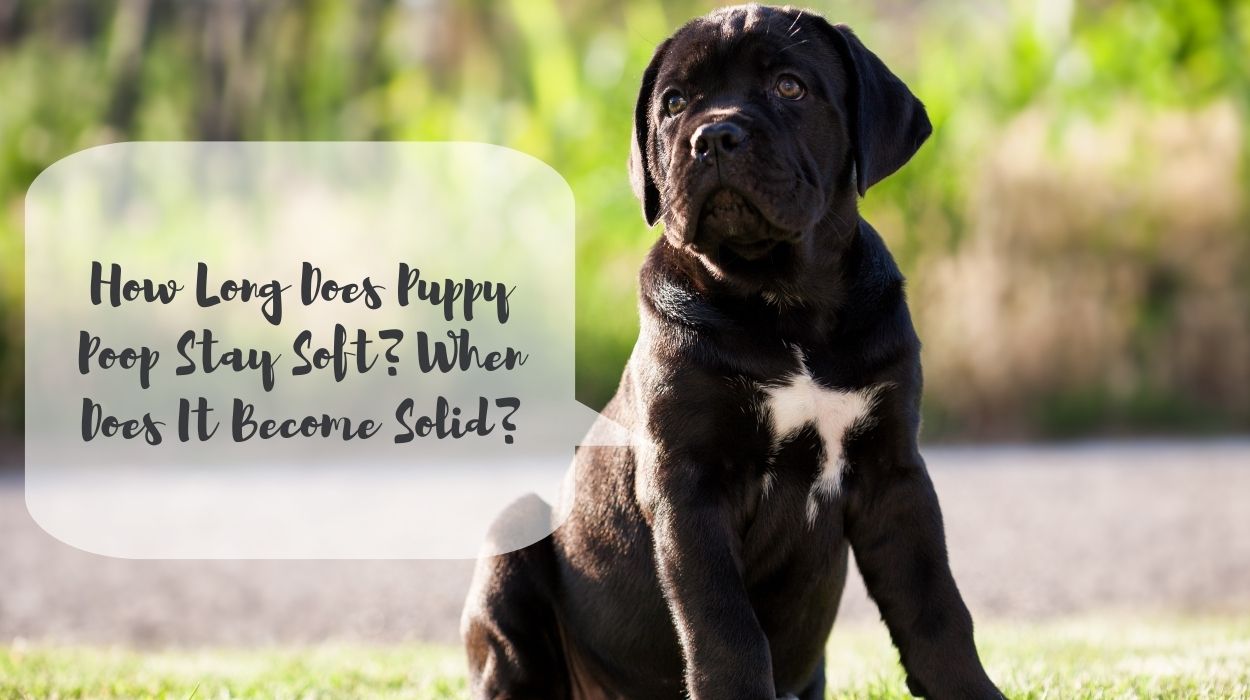When it comes to dog care, checking your dog’s poop is an important responsibility on the shoulders of dog parents. It is a widely accepted fact that your dog’s poop could tell a lot about their health. If your dog is pooping softer than usual, you should be very cautious.
Throughout this article, we will discuss how long puppy poop remains soft, what causes sudden changes to your dog’s poop, and what you can do to prevent softer poop or diarrhea in the future.
How long does a puppy’s poop stay soft?
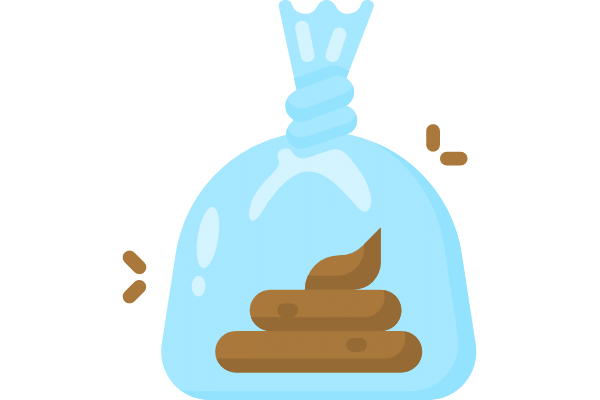
When it comes to dog poop, the big question is obviously how long does a puppy’s poop stay soft? Normally, it is common among puppies to have softer poop when they are breastfeeding. However, once they start weaning, their poop should begin to firm up.
If that’s not the case, then you should start monitoring your puppy’s poop closely to pinpoint any inconsistencies. There are several factors that can contribute to causing inconsistencies in your puppy’s poop.
Before understanding those reasons, let’s first understand what a normal puppy poop looks and smells like.
How does typical puppy poop look and smell?
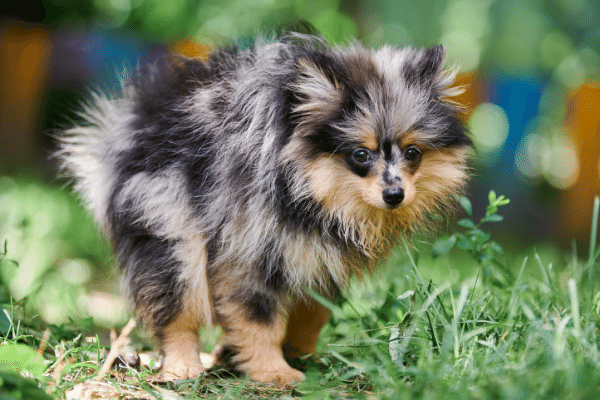
As a dog owner, dealing with your dog’s poop may not be your favorite task, but it is an extremely important responsibility.
The closer you look at it, the more you will learn about your pup’s health. Such information might come in handy when you have to detect any inconsistencies in your pup’s pooping behavior.
Every dog is unique, so your pup’s standard of normal, healthy poop may be slightly different than another dog’s. However, there are some parameters that will give you a general idea of how a normal puppy poop should look and smell like.
- Color: The poop of a healthy puppy should be chocolate brown. However, your dog’s poop may be colored differently if the food you’re feeding them contains added colors.
- Shape: Your puppy’s poop will have a log-like appearance. Further investigation is recommended if you observe any different shapes of poop.
- Size: The size of your pup’s droppings should be proportional to their food consumption. There is a possibility that the volume of poop may increase as fiber content in their food increases.
- Consistency: Normal pup poop should be compact, moist, and easy to pick up from the grass but feel like Play-Doh when squished. A watery or formless poop could indicate your pup has intestinal upset. A softer poop is to be expected if your puppy is still breastfeeding.
- Smell: The perfect puppy poop should have a distinct scent but not be foul. An abrupt change in the smell of the poop may indicate that something is wrong.
If you notice any significant deviations from the standard conditions given above, make sure to visit your veterinarian immediately. Continue reading to uncover the reasons behind softer pooping among puppies and what could cause it.
8 Reasons why your puppy’s poop may be soft
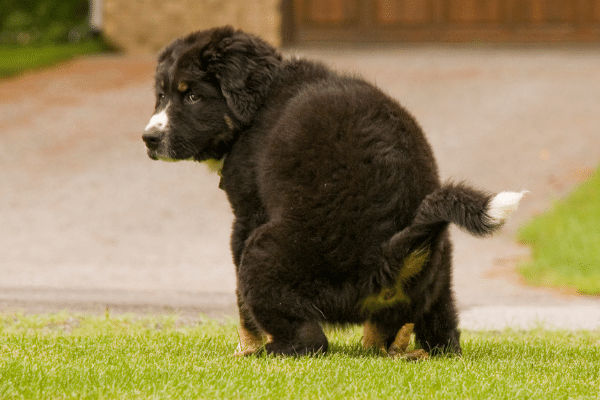
Your puppy may poop softer for many reasons apart from breastfeeding. Check out the following list of possible causes to investigate the root cause of the problem.
1. Sudden Diet Changes
One of the things dogs dislike is sudden changes in their surroundings and lifestyle. You may see softer poop if you have recently made any changes to your dog’s diet, such as switching the brand or quantity of food.
It is advisable to give your puppy ample time to get adjusted to the new diet.
2. OverFeeding
Overfeeding might sound like a bit of an exaggeration, but it is indeed a possible culprit behind the softer poop of your puppy.
When your puppy eats more than he can digest, his food becomes less digested, softer, and less processed.
3. Anxiety and Stress
Your puppy’s softer pooping could be related to anxiety and stress. When a dog is more restless and nervous than usual, its stool may become softer.
The cause of such stress could be a sudden change in diet, surroundings, or some other reason.
4. Eating Spoiled Food
Dogs are prone to eat just about anything they can get into their mouths. You might have a puppy with soft stools if it consumes spoiled food, garbage, or other random things such as shoes or poop.
Veterinarians often call such an occurrence “Garbage Gut” or “Garbage Toxicosis.”
5. Food Intolerance
It is also possible that you are feeding your lactose-intolerant puppy dairy products such as yogurt, cheese, and butter. When that happens, some puppies will have softened poop.
6. Parasites
Parasites are known to disturb the digestive mechanism of puppies. Whether your dog is a puppy or adult doggo; weakened immune systems, roundworms, hookworms, whipworms, and coccidia can cause illness.
The condition might even result in diarrhea or vomiting in addition to soft poop.
7. Dehydration
If your pup is dehydrated, that too might lead to them having a softer stool. Poop forms of dehydrated puppies are usually round as opposed to the log-like shaped poop of healthy puppies.
8. Parvovirus
It is a highly contagious virus mainly affecting dogs. If your puppy isn’t vaccinated against this virus, then it could be deadly for them.
Some of the common symptoms your puppy might show if affected by this virus could be lethargy, vomiting, soft poop consistency, diarrhea, fever, and even weight loss.
What is the difference between soft puppy poop and diarrhea?
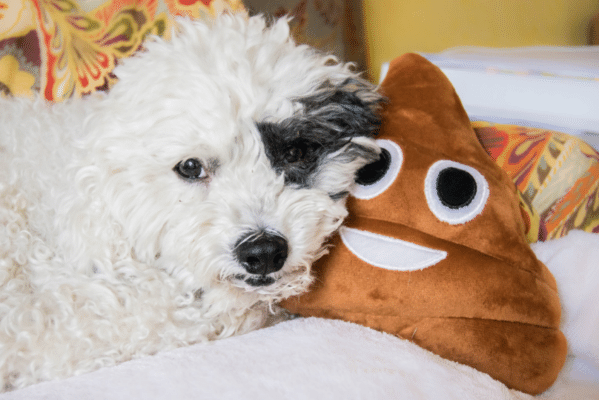
As we have mentioned earlier, it is normal for puppies to have soft poop. However, if the situation persists for a while, it may lead to diarrhea. Below we have discussed some key points that differentiate soft puppy poop from diarrhea.
- Gradually the soft stool retains its shape after being softer for a while. Contrary to that, during diarrhea, your puppy’s poop will be too watery, and it won’t be able to retain its original form.
- Even when your pup is soft stooling, the frequency during the day will remain consistent. With diarrhea, that won’t be the case, and it is very much likely that your pooch might have to poop several times a day.
- As softer poop is not too watery, it won’t dehydrate your pup. However, Diarrhea in most possible scenarios will cause dehydration.
What Can You Do At Home For Your Puppy’s Soft Stool?
Now when you know what causes soft stool among pups, its possible effects on their health, and how it is different from diarrhea, you might be wondering what you can do to prevent it. This section will be your guide to what you can do to deal with your puppy’s soft stool.
Use A Suitable Feed
It’s possible that the food you’re giving your dog is making their stomach upset. Look at their food ingredients and look out for too much starch from corn or other grains or a lot of fat, as both can soften stool.
Change Diet Gradually
One of the most common mistakes dog parents commit is suddenly switching food brands. Your pup needs time to get adjusted to the new diet. Hence, it is advisable to keep adding a little amount of new food in the old one daily, until they get used to the new food brand.
It is suggested that 5% of new food should be added daily to their meal, while 5% of the old food must be reduced. This process should take approximately three weeks.
Hydration Tests
If you’re concerned about the soft stool condition of your pup, you can even conduct Hydration Tests. Mainly there are two kinds of hydration tests that you can conduct at home to make sure your puppy is hydrated.
Skin Pinch Test: It’s a classic test most veterinarians perform. All you need to do is find the scruff of your puppy, located over the puppy’s shoulder or on the back of its neck.
- First, you should gently elevate the skin a couple of inches vertically.
- Next, you have to let go of the skin and observe.
- If it returns to normal quickly, then your dog is hydrated; however, if the reverse is true, then you should take your dog to the vet immediately as they could be dehydrated.
Examine Gums: The gums of a hydrated puppy will appear pink and will be moist. On the other hand, dry and tacky gums are signs of dehydration.
Use Probiotics
A puppy with soft stools might be experiencing an imbalance in the intestine. Balance is important for digestion and proper stool formation. A probiotic may be able to help. However, speak with your veterinarian first.
It is beneficial to your pup’s health to give them probiotics as it replaces dead intestinal bacteria, which are good for them.
Reduce Stress
Different reasons may cause dogs to undergo stress, such as changes in surroundings, overtraining, fear, etc. This can result in soft stool among pups.
If you want to reduce their stress, the first step is to identify the underlying cause and then try to eliminate it as soon as possible.
Visit A Vet
If you are not sure about how to tackle this whole soft poop situation, then it would be best to visit the vet. It is also important to visit the vet sooner than later, as it would result in early detection of any illness such as diarrhea or infection.
Frequently Asked Questions
Understandably, you might have some questions regarding why your puppy’s soft stool and what you can do about it. Here are some of the frequently asked questions related to the said topic to give you a better understanding.
Q. Is it normal for puppies to have really soft poop?
Even if your puppy is healthy, they can have soft stool. This is mainly because of the fact that they are still breastfeeding. However, if they had firmer poop earlier, and now it is getting softer and softer, then you should monitor the situation closely.
Q.How can soft stool affect my puppy?
In most cases, soft stool won’t be too dangerous for your puppy. However, if the situation persists, it can lead to severe conditions.
- If your pup has multiple stools a day, they could be dehydrated, as they are losing more water than they are consuming.
- When loose stool becomes a chronic condition, it might lead to malnutrition. This can have severe consequences for your pup’s health, as their intensities aren’t absorbing nutrients.
Q. At what age does soft stool start becoming firmer?
As soon as your puppy is weaned from your mother, they will start showing signs of firmer poop. When puppies are approximately 8 weeks old, this process begins and makes poop firmer gradually.
This would be a gradual process, and once their digestive system gets adjusted to a solid diet, firm stool will become the new normal. Don’t stress yourself if your fur baby is taking to get adjusted to the new food, as every dog adapts at a different pace.
Closing Remarks
Throughout this article, you have learned about what causes soft stool among puppies, how it affects them, and what you can do to prevent it. It is normal for healthy puppies to have softer poop when they are breastfeeding.
Moreover, after weaning, most pups have firm stools. The ideal puppy poop is brownish, log-shaped, and scoopable.
The main causes of soft stool include indiscretions in diet, changes in diet, stress, infections, food intolerances, and dehydration. By reducing stress, feeding them a healthy diet, giving them probiotics, and keeping them hydrated, you can keep your puppy from having soft stool.
We hope after reading this article, you get a better understanding of how to deal with your puppy having soft poop issues. Let us know what you think about this article.

Dr. Aram Baker has been with Santa Clarita Animal Hospital since 1995 and his special interests include behaviour medicine and dermatology. He graduated from the Cleveland Humanities Magnet Program in Reseda, CA and attended California State University at Northridge where he received a Bachelor’s degree in biology. He went on to pursue his Doctorate in Veterinary Medicine at the University of California at Davis. He also spent time in the zoological medicine department at U.C. Davis during his Junior and Senior years. He is dedicated to caring for all pets big or small, young or old with compassion, patience, kindness, and love.
